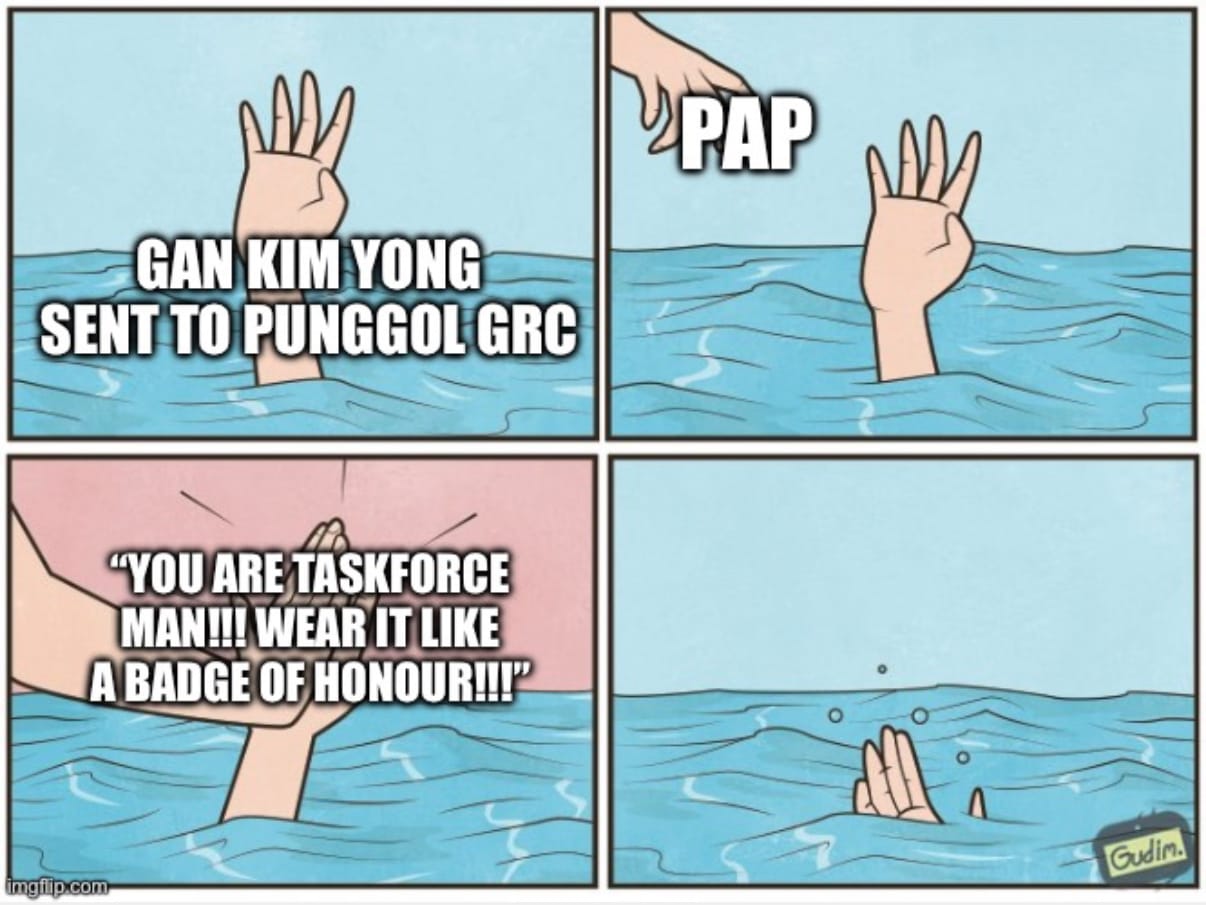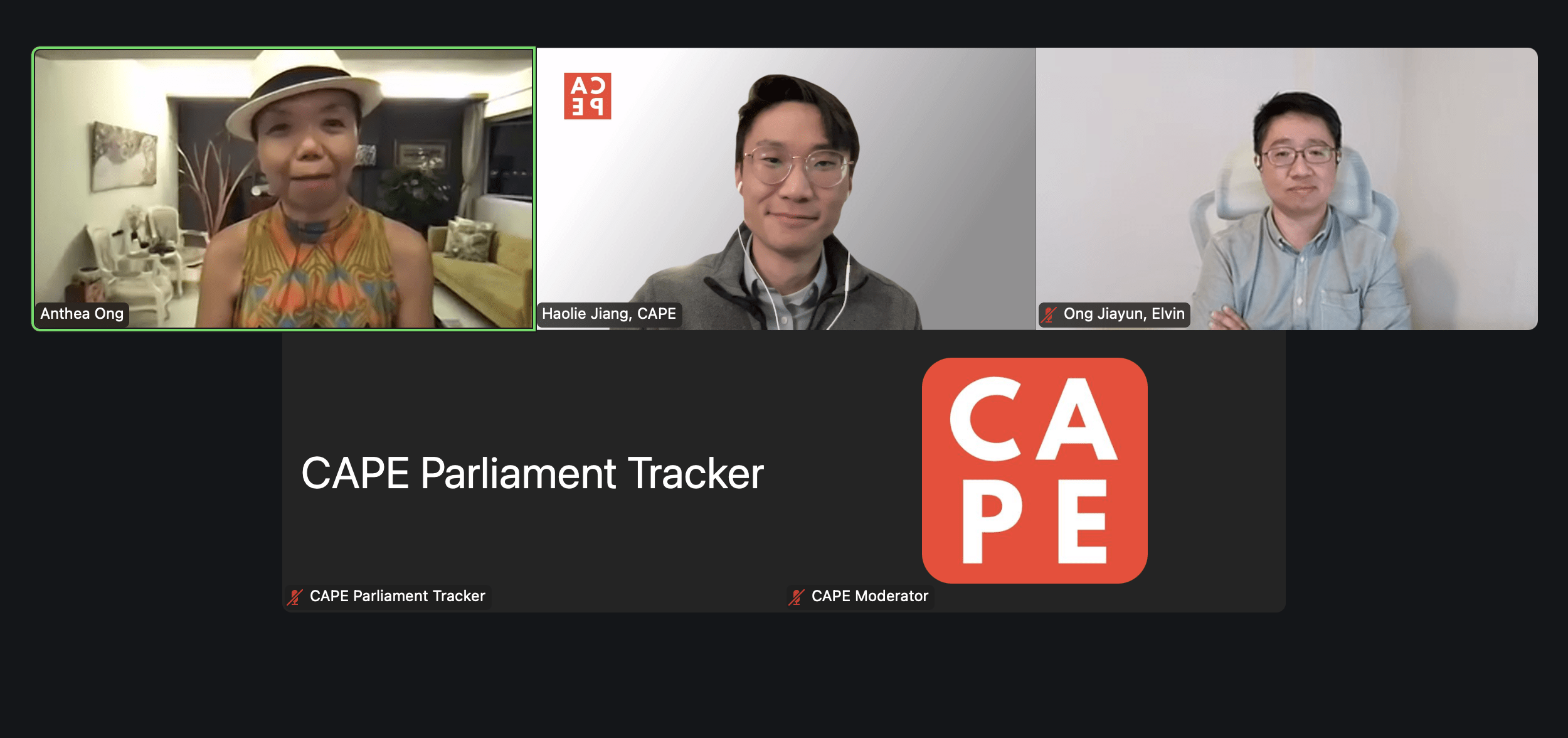While writing the GE2025 newsletter on Monday night, I realised that, after about a week of high-energy, high-excitement election activity, my battery had run a little flat. I stayed home last night because I had other work to sort out and a workshop early this morning (the reality of the multitasking freelancer 😅) and needed to make at least a feeble attempt to catch up on sleep. Instead of a wrap/rally reflection, I’d like to zoom in on one of the drums the People’s Action Party has been banging.
Also, I was so caught up in the GE that I totally forgot that Monday was WTC's seventh anniversary! 🎂 Happy birthday to this newsletter, entering primary school and creeping closer and closer to PSLE age 🥲
Anyway, this means the birthday discounts will run out soon—at the end of the month! Click on the preferred button below to get 25% off the first month of a monthly subscription, or 25% off the first year of an annual subscription.
Vote PAP, they tell us over and over. Vote PAP or wake up to a weakened PAP government on 4 May. And woe betide the Singapore with a weakened PAP in this tumultuous world.
“I have experienced ministers contesting in the GRCs, including in hotly contested GRCs,” Prime Minister Lawrence Wong told the crowd at UOB Plaza during the PAP’s lunchtime rally on Monday. “Their loss, if it happens, will be immediately felt and can’t be replaced.”
This is the line the PAP has deployed more aggressively in recent days, especially since the temperature of the contest in Punggol GRC—where the PAP sent Gan Kim Yong in a last-minute Nomination Day surprise—seems to be rising beyond what can be comfortably borne in a white uniform. Countering the argument for the importance of more opposition in Parliament to provide checks and balances, the PAP is reminding voters—particularly the ones in areas where the WP has a shot at victory—that we might not only lose established Cabinet ministers but also promising individuals who might become office-holders in the future. “I have new candidates who will add to my team, and eventually grow to take on larger leadership roles,” Wong also said at the lunchtime rally.
Do you really want to risk losing these ministers? they ask. But the real question is: Who created this situation in the first place?
The GRC system, under which candidates form teams to enter a winner-takes-all battle, was a creation of a PAP government. The practice of placing “anchor ministers” in GRC teams so incumbent backbenchers and new faces can benefit off their profile and popularity is also a political strategy the PAP has used election after election. 14 years ago, the PAP learnt that even GRCs “anchored” by well-respected ministers can fall when the Workers’ Party won Aljunied GRC, leaving George Yeo, who was the foreign affairs minister, with nowhere to sit in Parliament. They were given a refresher course in GE2020, when Sengkang GRC voters made sure that Ng Chee Meng, then a Minister in the Prime Minister’s Office, had to start entering Parliament House via the Public Entrance. But despite these two lessons, the PAP has continued with this strategy.
If the PAP is willing to take the risk of sending their most important ministers to hotly contested wards, why should Singaporean voters cover their butts for them?
Everyone loves Gan Kim Yong. He’s very important, they say, so do you really want to lose him? Can Singapore afford to?
If Gan Kim Yong was so important to PAP and to Singapore, why was he shuffled off to Punggol GRC at the last minute? Why did Wong not let him stay in his relatively safe seat in Choa Chu Kang GRC? Or, if we follow Tan See Leng’s story and accept there was enough time for the PAP to realise “it was a walkover, it was a walkover, it was a walkover” in Marine Parade-Braddell Heights GRC and move people around—then why not yeet Gan Kim Yong over to Marine Parade instead? Even better: use that tight timeframe to pull out all the presumably less important backbenchers and stuff the Marine Parade-Braddell Heights team with ministers, then watch them take their victory bows on Nomination Day itself! That way, Wong could have preserved the political fortunes of five office-holders.
If Wong and the PAP truly feel that some of their number are absolutely indispensable to Singapore’s future and best interests, there were many choices they could have made to keep them safe. (Here’s another one: stick a bunch of them in Ang Mo Kio GRC with Lee Hsien Loong. A team of four ministers plus the former prime minister? Confirm safe!) But they didn’t do that. Instead, they’ve spread their supposedly oh-so-important office-holders out, dangling the threat of their loss over Singaporeans’ heads and haranguing voters into saving the ministers the PAP themselves didn’t bother to protect.
This is just the risk of the GRC system the PAP created and the tactics they employ. You can win big or you can lose big. Whatever the outcome, they just have to reap what they’ve sown.

No Singaporean owes the PAP a living. A strong team doesn’t need to threaten people into propping them up.
Wong also keeps banging on about the need for a “strong” team and how more opposition legislators will lead to a “weakened” PAP government. What he hasn’t said is how much he needs for the PAP to be "strong". What does that mean? Give us the numbers. 49 seats, the minimum he needs for the PAP to form a majority government and which everyone expects the PAP to comfortably achieve anyway? 65 seats, for a two-thirds majority that will allow the PAP to amend the Constitution at will? 87 seats, to occupy about 90% of the elected seats like they did in the last Parliament, even though they didn't actually need that many to do anything (unless loads of their MPs didn't bother showing up for sessions, which happened)? What is he imagining when he pictures a "strong" team? Or is it just the idea of Singaporeans choosing opposition MPs over his people that he can’t bear?
Opposition candidates already have to fight with the odds stacked against them: shifting electoral boundaries, short notice, limited resources, a culture of fear ingrained in the bones of many voters. All we ask of the PAP candidates—who have plentiful resources and an army of grassroots volunteers—is that they convince us that they’re so good and so valuable to Singapore and our democracy that it’s worth choosing them over the much-needed check-and-balance the opposition is offering. If they’re as outstanding and as irreplaceable as Wong claims they are, surely they can manage that?
The truth is that, given the very high vote-seat disproportionality in Singapore, the PAP has, for years, enjoyed more seats in Parliament than it deserves. 60% of the vote share and 90% of the seats is not a good representation of Singaporeans’ wishes.
They tell us that a strong PAP is Singapore’s best hope in an uncertain world. They equate a strong PAP with a strong Singapore. But what if they aren’t the same thing?
A landslide win where the PAP gets the vast majority (or even all) the seats in Parliament, where Wong gets to keep everyone he wants to keep and have at least another five years to groom his juniors for leadership roles, would be great for the PAP. But there would be fewer voices probing their proposals, asking questions, demanding accountability and checking their power—which would be a great blow to our democratic system. No matter how much the party says otherwise, what’s good for the PAP isn’t always good for Singapore.
No Singaporean is obliged to vote for a current office-holder just because Wong says they’re important; what more a candidate who’s a backbencher or totally new but whom the prime minister has his eye on for promotion. Wong isn’t doing the hiring here; we are. Singaporeans will decide who is promising, who we want to give a chance to. His role, as a public servant, is to accept the will of the people and work with what he gets.
Parliamentarians got work anot?
CAPE has launched their report tracking data trends in the last Parliament (using data from August 2020 to November 2024). This is important work, please check it out!


Thank you for reading this special issue! Please help me get the word out about WTC by sharing this newsletter.

